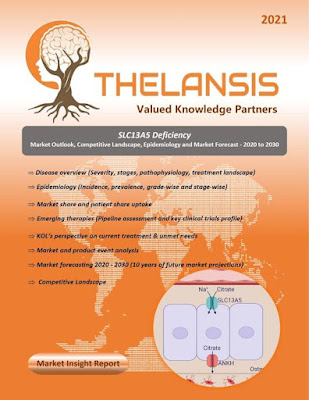SLC13A5 Deficiency – Market outlook, Epidemiology, Market Forecast and Competitive Landscape Report – 2020 To 2030
SLC13A5 deficiency is a rare autosomal
recessive disorder caused by mutations in the sodium-coupled citrate
transporter gene SLC13A5. It is characterized by infantile seizures and
neurodevelopmental delays. Patients with SLC13A5 citrate transporter disorder
are initially identified by the multiple types of seizures that begin within
the first week of life. This rare disease is due to changes (mutations) in the
SLC13A5 gene (solute carrier family 13, member 5). Seizures begin within a few
days of birth, which are often refractory to medications and most patients
remain on anti-seizure medications throughout life. Additional symptoms include
limited ability to speak, slow motor development including problems standing or
walking independently, as well as abnormalities in tooth enamel. Problems with
tone are also reported with chronic low tone but also periodic episodes of body
stiffening and post stiffening weakness. Siblings with the same genetic
mutation show differences in the severity of symptoms. Variations include the
type and frequency of seizures as well as the time course of developmental
milestones.
- Based on the literature review ~220 patients are being diagnosed in the USA and the disease affects both males and females equally.
The competitive
landscape of SLC13A5 Deficiency includes country-specific approved as well as
pipeline therapies. Any asset/product-specific designation or review and
Accelerated Approval are being tracked and supplemented with analyst commentary.
KOLs
insights of SLC13A5 Deficiency across 8 MM market from the center of
Excellence/ Public/ Private hospitals participated in the study. Insights
around current treatment landscape, epidemiology, clinical characteristics,
future treatment paradigm, and Unmet needs.
SLC13A5
Deficiency Market Forecast: Patient Based Forecast Model (MS. Excel Based
Automated Dashboard) which Data Inputs with sourcing, Market Event, and Product
Event, Country specific Forecast Model, Market uptake and patient share uptake,
Attribute Analysis, Analog Analysis, Disease burden, and pricing scenario,
Summary, and Insights.
S. No Asset Company Stage
1 TSHA-105 Taysha Gene Therapies, Inc. Phase 1

Comments
Post a Comment